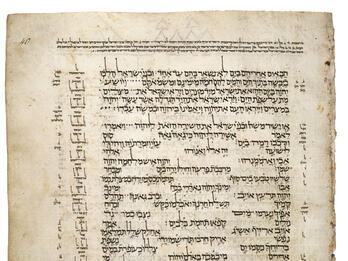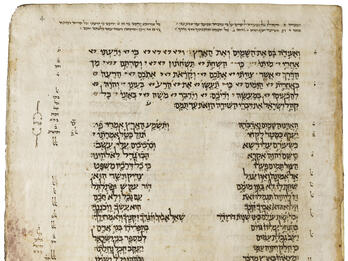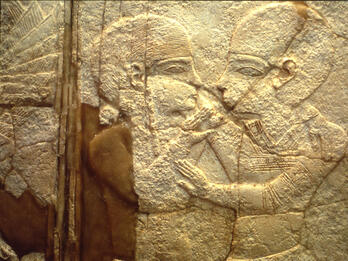The Song of Moses
Deuteronomy 32:1–43
Biblical Period
This poem (called a shirah, “song” or “poem,” in Deuteronomy 31:30 and 32:44) is a reflection on Israel’s history following its settlement in the promised land. According to the prose narrative preceding the poem, it was taught to the Israelites by Moses in advance of the events so that when the punishment came it would serve as a “witness,” indicting them for their sin (31:19 and 21; 32:44). Israel, described in very uncomplimentary terms, is accused of disloyalty to God despite God’s acts of care and loyalty to Israel. Because of this, God at first determines to punish Israel. But such punishment might lead the enemy to think that its victory was due to its own strength and not to God; to disabuse them of this illusion, God decides ultimately to punish Israel’s enemies, who are God’s enemies as well, thereby vindicating Israel and showing God’s exclusive power in the world. The poem both chastises Israel for its wrongdoing and at the same time offers hope and encouragement that God will protect them. The end of the poem, verses 39–42, is a resounding praise of God. The language of the poem is difficult in places and its structure not easy to follow. The language (sometimes archaic) and contents suggest that it was composed before the fall of the Northern Kingdom of Israel and earlier than the rest of Deuteronomy. It was later incorporated into the book and attributed to Moses because it explained the disaster in theologically meaningful terms. Like the Song at the Sea, it is written stichographically in Torah scrolls and in biblical manuscripts.
Related Guide
Biblical Poetry
Biblical poetry is characterized by short parallel lines, without a fixed meter or rhyming pattern, and include love poems, laments over the dead, victory poems, and laments, among others.
You may also like

Song at the Sea (Exodus 15), Leningrad Codex

Song of Moses (Deuteronomy 32), Aleppo Codex

The Song of Songs



